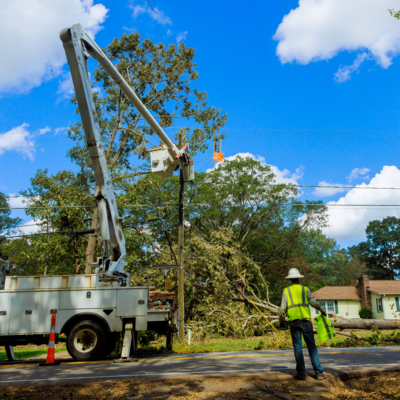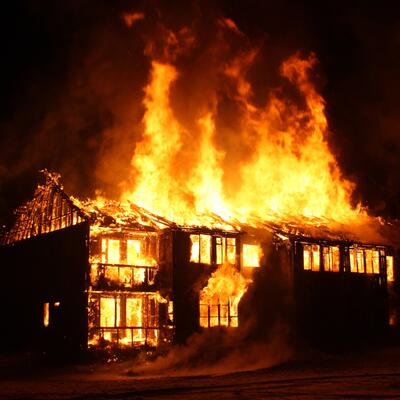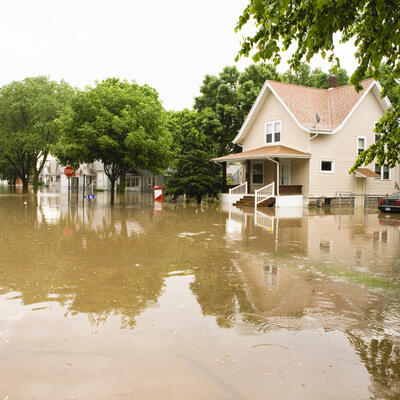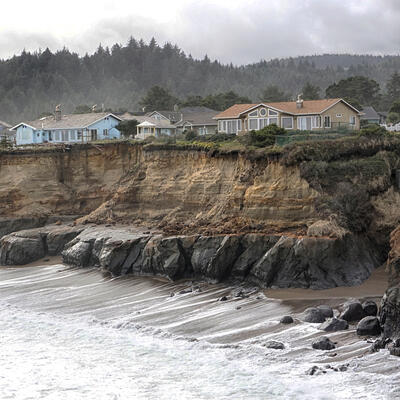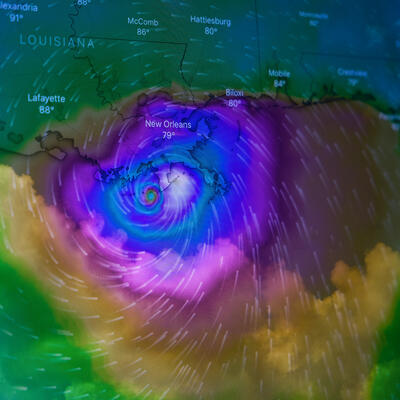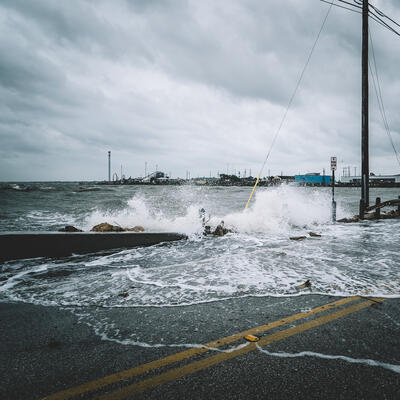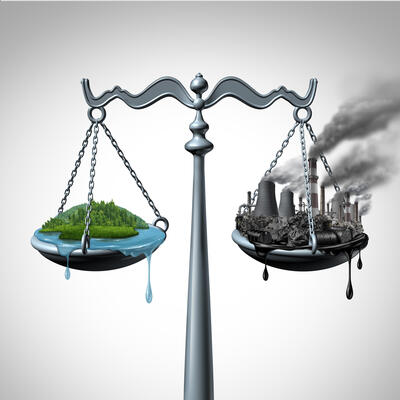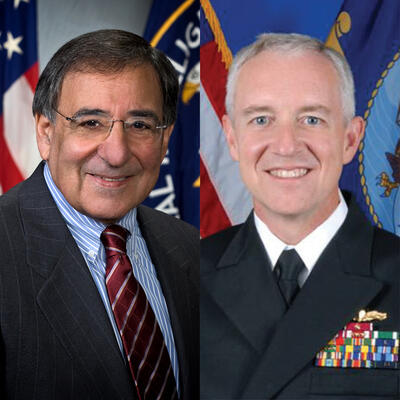
National Security and Climate Change
Guests
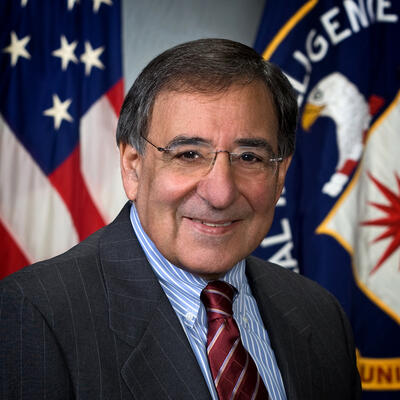
Leon Panetta
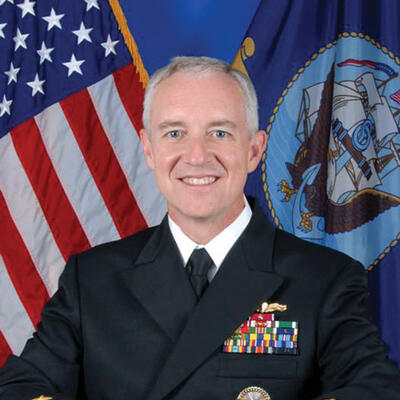
David Titley
Summary
What’s the connection between climate change and national security? “Military commanders don't operate on the basis of fiction,” says Leon Panetta, who served as Secretary of Defense and Director of the CIA under President Obama. “Understanding climate change and what was happening had to be part and parcel of our effort to protect our security.” The military has long seen climate as critical to readiness, as Rear Admiral David Titley (Ret) explains. “If you’re directly connecting renewable energy to increasing our combat effectiveness,” explains Titley, “the military is all in.”
Full Transcript
Announcer: This is Climate One, changing the conversation about energy, economy and the environment.
Leon Panetta: Military commanders don't operate on the basis of fiction. They operate on the basis of reality.
Announcer: Leon Panetta served as Secretary of Defense and Director of the CIA under President Obama.
Leon Panetta: Understanding climate change and what was happening had to be part and parcel of our effort to protect our security.
Announcer: The military has long seen climate as critical to its readiness, as Admiral David Titley explains.
David Titley: Readiness is the ability to make sure that when we put our sons and daughters, our soldiers, our sailors, our airmen and Marines in harm's way to protect our nation's interests that they are going to be successful at that even when the other guy is either metaphorically or literally shooting at us.
Announcer: Climate and National Security. Up next on Climate One.
Announcer: What’s the connection between climate change and U.S. national security? Welcome to Climate One – changing the conversation about energy, economy and the environment. Climate One conversations – with oil companies and environmentalists, Republicans and Democrats – are recorded at the Commonwealth Club of California, and hosted by Greg Dalton.
I’m Devon Strolovitch. Why has the U.S. military been one of the most eager adopters of renewable energy?
David Titley: If you could run those forward operating bases let's say on solar, let's say on wind or efficient batteries or some kind of combination or just simply be more efficient. If you’re directly connecting that renewable energy to decreasing the risk for American servicemen and women increasing our combat effectiveness, the military is all in.
Retired Rear Admiral David Titley served as a U.S. naval officer for 32 years. In 2009 he initiated and led the Navy’s Task Force on Climate Change. We’ll hear Greg Dalton’s conversation with Admiral Titley about climate change and military readiness later in the program.
First, Greg talks to Leon Panetta, who served as Secretary of Defense and Director of the CIA under President Obama. Since retiring as Defense Secretary in 2013, Panetta has served as Chairman of The Panetta Institute for Public Policy at the California State University, Monterey Bay. Here’s their conversation about climate change and U.S. national security.
Greg Dalton: So what is the connection between climate change and national security. Climate change is thought about something far away in geography or time. What’s the connection to U.S. national security.
Leon Panetta: Well I've always felt that you can't really provide for the security of the United States without accepting reality. The reality of adversaries. The reality of competing economies. The reality of changing cultures and the reality of climate change is something that I think also has to be recognized as one of those things we have to confront now. And whether it's increasing the rising oceans that we’re now seeing. Whether it’s the impact on weather systems, the reality is that all of that impacts on people. And if people are finding it difficult for one reason or another, either to survive or to have to change where they exist because of it's no longer viable for climate reasons, then that creates instability. And we have to be aware of that instability and with those challenges are. And that's why I always believed as Secretary of Defense and also as director of the CIA that understanding climate change and what was happening had to be part and parcel of our effort to protect our security.
Greg Dalton: There was an article in the New York Times recently connecting drought in Guatemala. People have a choice. Their crops fail, they have a choice of going to the city maybe there is gangs or they go to El Norte, come up north. So how is this migration of people maybe climate and drought is one factor, it's challenging democracies, it’s challenging the European Union. It's challenging America as an open society. How are we gonna deal with this movement of people across borders that are challenging some of our core institutional Western values?
Leon Panetta: Well that’s one of the fundamental issues that the world is trying to confront today. And the problem is that because of that movement of people it is feeding the rise of populism. It's feeding authoritarian governments. It's feeding counter reaction among people that feel that that movement of people threatens them in terms of their life and their livelihoods. And so we are now witnessing this larger movement of people through migrations for a lot of different reasons. Part of it violence, part of it climate change, part of it the impact of droughts and famine. Part of it is just the economics of many of these countries in terms of the poverty that they're enduring and trying to find a better life somewhere else. All of that is culminating in this fast movement of refugees and the ability or inability of countries to deal with that I think can very well be the precursor of conflict and violence. And, you know, we have to be very aware that these kinds of issues if we don't deal with them in an orderly and common sense and compassionate way, these issues will create conflict. And that's what I worry about the most because I sense the inability of countries to deal with this rationally and with common sense and compassion. I think the inability to do that is creating even greater disruption in terms of governments and peoples. And when disruption happens when we see instability in these countries we are looking at the seeds of some kind of future conflict. So that is a very good example of one of the pressures that is going to face leadership in the 21st century, whether leadership in these countries can confront that will tell us a lot about what the future holds.
Greg Dalton: Last I checked, not a lot of immigrants going into Russia. Some people wonder whether Russia is a winner in a warmer world. They have, will be warmer some of their resources will be acceptable. Is Russia a winner in a warm and potentially destabilized West?
Leon Panetta: You know I think there are times when we overvalue the authoritarianism of Russia and Putin. Because while it may be easy for him to kind of dictate what Russia should or should not do the reality is Russia's having a difficult time trying to provide any kind of economic opportunity for its people. It's having a difficult time in terms of being able to promote the kind of values that people search for when they’re struggling to try to be able to have some influence over the direction of their nation. So I think that while initially one can argue that because they’re an authoritarian government and therefore can have greater control over their borders and what happens within Russia by virtue of the positions they take. I think in the long term, I think countries like Russia, authoritarian countries like Russia ultimately will pay the same price that all authoritarian governments had paid throughout history, which is that by virtue of the inability to provide real opportunity to people real economic progress and recognize kind of the human values that we have always recognized in the democratic world. I think ultimately that will be something that will undermine their strength rather than improvement.
Greg Dalton: One area that is of concern potentially with Russia is the Arctic. And you've spoken about the warming Arctic region that not a lot of people paid much attention to suddenly it's more accessible the Northwestern passage now there is tourism. So what are the geopolitics regarding Russia in a changing Arctic that suddenly has more value, perceived value?
Leon Panetta: Well again that gets back to this fundamental issue of how climate change can impact national security. The Arctic is probably one of the great examples of that the melting ice cap is now opening up claims to the Arctic region that are clearly going to produce a lot of contesting nations trying to A, determine who gets first cut at the resources of the Arctic. Secondly, who gets the opportunity to be able to control the Northwest Passage the ships that are gonna be passing there. The economic impact, the security impact of that are all factors that are taking place today at a time when frankly there has been a lack of diplomatic effort to try to foresee how should we resolve these issues. How should we try to determine who in fact should have some role to play in what happens in the Arctic instead because of the failure of international organizations because the failure of diplomacy. We're kind of operating on an ad hoc basis right now and the United States bears a lot of the responsibility. We are a country that normally has provided leadership on these issues. We are ones who have said this is an issue that needs to be resolved peacefully. It needs to be resolved diplomatically. We need to have all the parties at the table deciding how we deal with the changes that are taking place in order to make sure that it does not produce the kind of conflict that can lead to war. It's not only the threat of climate change, but it's also the threat of the lack of diplomatic leadership by the United States in particular to try to help resolve these issues peacefully. Those are real threats in today's world.
Greg Dalton: Defense Secretary Mattis has talked about un-tethering the U.S. forces from fossil fuels. How do you view the connection more on the battlefield fossil fuels, supply lines, fuel convoys. How are they a vulnerability or an asset?
Leon Panetta: It's a huge issue and when I was Secretary of Defense we’re really trying to encourage particularly the Navy, which depend so much on fuel for our fleet. The Navy was really working in trying to develop alternative fuels.
Greg Dalton: The Great Green Fleet fighter jets, you know, with biofuels.
Leon Panetta: Exactly. The biggest issue for, you know, a modern military force is supplying the fuel that is essential to, you know, the weapons of war. That's a reality.
Greg Dalton: Fuel convoys are great targets.
Leon Panetta: Yeah, they’re great targets. The dependence on our ability to be able to fuel whether it's our fighter planes or bombers, our ships, our tanks is critical to our war fighting capacity. And so it made a great deal of sense to begin this effort to try to get the Pentagon and DoD to be able to move towards alternative fuels. Because not only would that give us a greater capacity to be able to operate without these long lines of fuel supply that are essential in modern times, but it's also right for the world in terms of being able to gradually move away from fossil fuels and develop alternatives. And since the Pentagon is one of the biggest users of fossil fuel in everything we do it made a hell of a lot of sense to have the Pentagon lead the effort to move away from that. I’ve actually seen in battle zone areas like Iraq and Afghanistan where we were making real progress in the use of solar for communications purposes and for providing other means of power that, you know, that encouraged me that this isn't just fiction. This is a real way to deal with the real problem.
Greg Dalton: I've heard people talk about diesel generators in the desert. They have a heat signature. They have a sound signature that makes basically saying here we are, whereas solar and batteries are quiet.
Leon Panetta: No, absolutely. Every time you have an engine out there that's using fossil fuel there is clearly a signature that we can pick up. We can pick it up in space we can pick it up using our intelligence capabilities. It becomes a clear target. And the ability to try to avoid that I think relates very much to our ability to more effectively defend our forces when they are in these areas.
Announcer: You’re listening to a conversation with former Defense Secretary Leon Panetta. Coming up, Greg Dalton asks how climate change threatens the stability that U.S. national security depends on.
Leon Panetta: These vast migrations of people in many ways due to climate problems to poverty to starvation to other factors that contribute to instability. That's what our adversaries care about. They are interested in producing instability.
Announcer: That’s up next, when Climate One continues.
Announcer: We continue now with Climate One. Greg Dalton is talking about climate change and national security with Leon Panetta, former Secretary of Defense and Director of the CIA under President Obama. Here’s Greg.
Greg Dalton: U.S. military was one of the first organizations to recognize the greenhouse gas effect because it was recognized that the warming atmosphere could affect missile guidance and navigation systems back in the 50s. And Secretary of Defense, James Mattis said, “Climate change is impacting stability in areas of the world where our troops are operating today." And yet this administration doesn't recognize climate change. What's going on inside the military in terms of their pragmatism planning for these things are they prohibited from doing the things you're talking about?
Leon Panetta: Well I know Jim Mattis. He served as one of my combatant commanders when I was Secretary of Defense and I have tremendous confidence in his ability. He understand it, he gets it he knows what the threats to our security are all about. And I think even though he operates in an administration that often times takes positions that are counter to what I think Jim Mattis really believes in terms of traditional national security policy that he continues in his own way to try to make sure that our security is protected. He obviously is in a, he’s in a difficult position because, you know, he is without question extremely important to decisions that affect our national security, our deployment of forces the kind of structure, for structure that we’re going to have and maintain for the future. But at the same time he believes deeply in those realities I talked about at the beginning of this conversation. I mean military commanders, people who are good military commanders don't operate on the basis of fiction. They operate on the basis of reality. And Jim Mattis knows that climate change is real. He knows that it's impacting our security. He knows that it's important for the Pentagon and DoD to take steps to deal with that. And my sense is he's going to continue to do that. Try to implement policies that will give us the best protection for the future. He’ll try to stay below the radar. He'll try to avoid becoming a target for tweets from the White House. He's been good at doing that so far. But Jim Mattis is somebody who's fundamentally dedicated to the best national security interests of our country. And I think he's going to continue to do that.
Greg Dalton: I looked up some of your past comments on climate change and national security and clicked on the link. And those pages on the Department of Defense website no longer exists. Error 404. So there’s been a scrubbing of climate change information and when you ran the CIA helped develop perhaps start its capacity to understand climate as a security risk. Some of that may have been disbanded, you know, there's concerns about NASA satellites funding of observation data. How concerned are you about our intelligence gathering capability to know what's really happening out there in an administration that is scrubbing climate everywhere?
Leon Panetta: Well, you know, I just think it's an example of frankly the stupidity of this administration if they think that simply wiping out terms that refer to climate change is somehow going to make the climate better.
Greg Dalton: Remember North Carolina outlawed sea level rise.
Leon Panetta: I mean so it’s just, you know, it doesn’t make sense. And I understand that kind of ideological approach to the issue if the view is that it's not real, then you gotta, you know, make sure that nobody talks about it. But, you know, I think those who, for example, said that, you know, discrimination and segregation is not a real problem that we don't have to confront the issue of civil rights and that hope that somehow people would kind of accept that were proven wrong because that is not the course of history. And I think in this instance it is not the course of history that we can just sit back and pretend that climate change is not happening. It is happening. It's a reality. And that one way or another I think this country, whether it's under this president or another president ultimately has to recognize the world for what it is.
Greg Dalton: You were running the CIA when there is an operation to get Osama bin Laden in Pakistan. And whenever there is a person with a backpack or someone try to light their shoes on fire on an airplane there’s a face in a villain. One of the challenges of climate is there is no face of a villain with an intent to do harm. It's faceless. So how do we get a challenge that doesn't have a black cat that we can go after? I often think that if, you know, if North Korean dictator was causing climate change we be doing a lot more about climate change.
Leon Panetta: Well I think that's true. I mean, you know, cyber I've often said is the battlefield of the future. And for a long time people did not really take cyber seriously.
Greg Dalton: You can't see it. It's hard to see.
Leon Panetta: Yeah, it’s hard to see. They know there's hacking going on there's some challenges to privacy. But the fact that cyber could be used not just to disrupt service that it could be used to steal intellectual property but that cyber could be used to literally attack other countries and destroy their capabilities, I think, was underestimated for a long time. And now today we recognize that the real threat that cyber can represent not only the way the Russians used it to undermine our election institutions, but the fact is, you can now develop a sophisticated virus that could probably take down our electric grid system, our financial systems, our government systems and really paralyze this country. I think the same thing is true for something like climate change. I think the reality is, having seen these vast migrations of people in many ways due to climate problems to poverty to starvation to other factors that contribute to instability. I think that our adversaries recognize that using that capability could very well advance instability and that's what our adversaries care about. We saw that with the Russians. We see that with the Chinese. We see that with other adversaries. They are interested in producing instability and they will produce instability through cyber, they will produce instability towards doing something that can impact on the way we live. But unfortunately, as I've often said to the students at The Panetta Institute, in our democracy we govern either by leadership or by crisis. If leadership is not there and dealing with these threats that we just talked about then make no mistake about it crisis will ultimately provide that direction. It's a terrible way to govern because I think in many ways, you lose the trust of the American people when you govern by crisis. But I think today right now we are losing leadership on the issue of recognizing the threat from climate change. And the result will be that at some point crisis is going to drive that policy and frankly that is not a good way to govern.
Greg Dalton: If you’re just joining us I’m talking with former Secretary of Defense Leon Panetta. This is Climate One I’m Greg Dalton. Some of the elders on the Republican Party, George Shultz, James Baker have the Baker-Shultz plan, it’s carbon dividend plan. Recently Trent Lott, former Senate Republican leader came out in support of it. But do you see any chance of something like that taking hold, because any Republican who is in elected office knows if they embrace that they face a primary challenge from the right just as others Bob Inglis, former member of Congress got tea partied out of Congress. So this gets to, you know, can reasonable policy here we have the titans of the Republican Party from your era, Rob Walton, chairman of Walmart supporting it, and yet it’s having difficulty getting traction in Washington because of the system and the fear of a primary challenge.
Leon Panetta: Well you know I've been in public life for over 50 years. At one point in my life I was chairman of the House Budget Committee at a time when deficits were growing. And same problems existed at that point. Republicans didn't want to raise taxes. Democrats didn't want to deal with the spending issues. And so there was little action being taken as deficits continue to increase. At some point there was a recognition that if we allow those deficits to continue we’re gonna face economic crisis. And so because of the leadership from Republicans and Democrats at the time there was a willingness not only to take steps to control spending, but to raise taxes. And we did that in a number of budget agreements that ultimately, by the way led to a balanced budget in this country. That was a while ago but it did achieve that goal. I think the same thing is true here that at some point there will be a recognition that we are going to have to act not just on taxes, we’ll have to act on entitlements and other areas in order to try to set a better course for this country in terms of dealing not only with our national debt which is now almost 78% of GDP unlikely to go to 150% of GDP on the present course, that at some point the leadership of this country, Republican and Democrat are going to have to recognize that they're going to have to take some tough decisions in order to put our democracy back on the right track. That’s not gonna be easy. It's gonna require leaders that are willing to take risks. It’s gonna require leaders that could lose elections by virtue of doing it. But the history of this country is over 200 years is that every time we have faced that kind of major crisis, leadership has been willing to rise to the occasion. And I'm hopeful that it will as well with our country.
Greg Dalton: In the absence of movement in Washington some people are looking to corporations. Corporations have supported the Paris climate accord. Corporations have sustainability plans. You’re on the board of Blue Shield California, one of the largest health insurers in the country. Does the board ever talk about climate as a health issue?
Leon Panetta: You know, that's an interesting issue because while I'm sure that the people around that board table largely agree that climate is a problem. I'm not sure that we've ever kind of tied climate change to rising healthcare problems in terms of the people.
Greg Dalton: Warmer temperatures have disease factors.
Leon Panetta: Exactly.
Greg Dalton: Heat deaths. Zika is coming north.
Leon Panetta: Exactly. Now the movement of germs of new diseases, what we have found is that as a result of climate change we are seeing more of that happening and more threats arising as a result of that. The fact is that it does impact on our health. I think there is a tie. Once we are able to really establish that connection, I think that's when people are gonna suddenly it's one of those moments where the American people suddenly say, oh my god this is real in terms of affecting me, my life, and the children of my family. And when that happens, there will certainly be a response but I hope it's not too late.
Greg Dalton: You live on a walnut farm that you’re dad planted, you have six grandchildren. How will climate affect you and your family?
Leon Panetta: I don't think there's any question. I mean, even in my own lifetime, I've seen the change in the climate affect our area. We are, you know, Carmel Valley was a great place to live. My father and mother who lived in Monterey went out to Carmel Valley. And I know that one of the reasons they did was because there was a lot of fog along the coast, but inland in Carmel Valley, it was a sunny area. Today very frankly, you don't see as much fog coming into Carmel Valley, it’s much warmer. It affects water supplies it affects our ability to raise what we used to raise in the past more easily. It affects, you know, a lot of the growth and shrubberies and mountain greenery that we used to always enjoy there. It gets drier much faster and the result is that you get a fire hazard that's even much greater and we see that obviously in California. But we worry about that now more than I think we ever have in a place like Carmel Valley. You know, these things are happening. We’re seeing what’s happening in California, we’re seeing what the fires are doing in California. We’re seeing what droughts, the impact that droughts can have on our lifestyle. These things are real. And as I said, what is necessary more than ever is to understand that this is reality it is what is happening and that we cannot pretend that somehow this is just something that we've seen in the past and therefore shouldn't worry about. I think this is a fundamental issue that is affecting life itself. And, you know, I'm by nature an optimist, you can't be in politics in this country and not be an optimist. I think with enough people continuing to talk about the impact taking steps to deal with it communities, corporations others that try to do what's right. I think that there will be a time when the world as it tried to do in Paris will in fact unify to confront this drought.
Announcer: Greg Dalton has been talking to Leon Panetta, former Secretary of Defense and Director of the CIA under President Obama. This is Climate One. Coming up, Greg talks to Admiral David Titley about climate change and military readiness.
David Titley: Readiness is the ability to make sure that when we put our sons and daughters, our soldiers, our sailors, our airmen and Marines in harm's way to protect our nation's interests that they are going to be successful at that even when the other guy is either metaphorically or literally shooting at us.
Announcer: That’s up next, when Climate One continues.
Announcer: You’re listening to a Climate One program about climate change and national security. We turn now now to Greg Dalton’s conversation with Retired Rear Admiral David Titley, who served in the U.S. Navy for 32 years. He now teaches in the Department of Meteorology at Penn State University, where he also founded and directs the Center for Solutions to Weather and Climate Risk. Here again is your host, Greg Dalton.
Greg Dalton: Norfolk, Virginia is home to 80,000 troops in the world's largest naval base. It's also experiencing crippling floods. So can you describe what’s happening there and what we know about what's happening in Norfolk?
David Titley: Well sure. Well Norfolk as you mentioned is a very large military installation in the United States and it's actually not just the Navy, the Air Force, Langley Air Force Base one of the largest Air Force bases that service has is also if anything lower believe it or not in elevation than the Norfolk Naval base. So and there's also extensive there are some army and there's extensive Coast Guard, there's NOAA, it’s really a federal city down there along with many differing local jurisdictions. Norfolk is fascinating, sort of from a climate in oceanography point of view as well it's kind of a hotspot if you will for sea level rise. In addition to the global sea level rise which every time, you know, as we send climate scientists either to Greenland or Antarctica we seem to up our predictions of what is reasonable or even a worst-case scenario over the next let’s say fifty to a hundred years. Norfolk also tends to get increased sea level rise from a combination of local effects. Many of your listeners may have heard how the Gulf Stream appears to be slowing down. And that actually one of the lesser-known consequences of the Gulf Stream slowing down is the sea levels actually rise on the cold side and that would be Norfolk. So they get a little extra boost from there. And then for reasons having nothing to do with climate change, the land on the mid-Atlantic coast certainly centered around Norfolk, Virginia, Cape Hatteras places like that is actually receding and that's actually a consequence from the last Ice Age. But when you add all of those effects together it’s not unreasonable to plan for sea level rise, you know, 4, 5, 6 even 7 feet in let's say the next century in Norfolk, Virginia. That's a lot. You know, 1 foot, 2 feet, we can probably deal with fairly well without, you know, and it’s still a long ways off if you said that's all it was gonna be. But when you start talking these 3, 5, 7 feet rises in inside of a century, those are very scary and they're frankly, they’re hard for planners to imagine because we've never experienced that certainly in modern times but really in human civilization times.
Greg Dalton: And some studies have suggested that there is up to 200 military bases around the country that are threatened in one way or another by rising seas and climate change. Do we have a scope of the threat to U.S. military bases from climate?
David Titley: Yeah, I would say right now honestly the best work is probably being done by the Union of Concerned Scientists and I believe that's a report you're referencing. That report, among other things, spurred the Congress iin 2017 to actually put into the defense, the annual Defense Authorization Act which was signed by President Trump language that basically tells the Department of Defense, hey you guys this climate thing it’s a big deal and you need to pay attention to it. I mean it says it in legal language, but that's basically what it says, and tell us your, I think its top 10 bases for each service. So Army, Navy, Air Force, Marines. Tell us your 10 most threatened bases due to climate. And it doesn't have to be sea level, it could be running out of water. It could be freshwater flooding. It could be sustained excessive temperatures that preclude let’s say high intensity training if that's the core mission for the base. The way I look at this and actually the Australians did this about 10 years ago, back when they were serious about this. And just like in our country their government's interest is waxed and waned on this issue. But when they were serious they actually kind had you can imagine, like almost a very simple matrix if you will, a 2 by 2 matrix. And on one side of the matrix is sort of just vulnerability to climate change. And on the other side is some quantification of military value of that base. And of course where you would want to put your first dollar is, where is the intersection, right? Where is the most vulnerable base with the highest military value. There no doubt are some bases with very high military value, but for whatever reason those particular localities may be less impacted by direct climate influences. So, you know, we probably shouldn't spend money there. But the ones that are very valuable from a military perspective and vulnerable from a climate perspective, I would argue if the Congress is looking for, you know, how to quantify how to analyze of where to spend money if they choose to do so, that’s the type of list you need. And that's what certainly some organization such as The Center for Climate Security and others are trying to help the Pentagon really think through.
Greg Dalton: How will this affect where and how U.S. troops are deployed overseas thinking of vulnerable bases? Guam comes up, Diego Garcia bases in the Pacific that often support operations in Asia or even the Middle East, you know, will this affect where troops are deployed or you gonna have to abandon certain bases and find new ones?
David Titley: I think the ones you would look at first that might be moved out of would be the ones that are really low-lying atolls. So I mean something I've asked the Pentagon is does anybody really done a detailed analysis of effective sea level rise. So it really includes global sea level rise plus whatever the local currents are doing plus that rise and fall of the land like we talked about with Norfolk. How does that look on Diego Garcia because that's a very, very strategic base. It’s actually British, it’s British Indian Ocean Territory. The Brits let us use it as long as we’re nice to the birds and the fish and the turtles, so we are. And I would argue that just about every significant Department of Defense operation in Southwest Asia in the last 40 years has had critical support in one way or another, come from Diego Garcia. I would look at that the Air Force uses some of the Marshall Islands like Kwajalein for both testing for their what they call their Space Fence which is this global basically surveillance system that is looking up so that we the United States, United States military can basically track for all intents and purposes every object in space and that's good. We need to do that for our defense. But we use some of those very low-lying atolls in the Pacific as key components of these kind of surveillance networks. And these are again places where, you know, details count, sort of like to paraphrase Tip O'Neill, all sea level rise is local. And you need to again account for, you know, when we talk about climate vulnerability. Now places like Guam, I mean, I was stationed out in Guam in the mid-1980s. I don't know if you've been out there or not but it's actually quite volcanic. The northern half of the island is volcanic, the southern half I think is sort of raised limestone. But a lot of Guam is actually quite a bit above sea level, like the really big Air Force Base there Andersen Air Force Base, it's up on a raised plane and there's quite dramatic cliffs right at the end of the runway that dropped down into the water. But if they had a meter of sea level rise Andersen Air Force Base on Guam is gonna kind of like do a big yawn. It's just not gonna impact them. There is a naval base there but it's, you know, and so some of that would be affected but again, the land kind of slopes upwards. So do you have to, you know, move the piers back and do some things like that expand the breakwater but I could see how Guam could be viable for frankly a long time. But these are aeges, these are the kinds of analyses because there's no just one size fits all on these. And, you know, this becomes a lot of work you really have to understand, you know, the local terrain you have to understand what that base is really used for what are the critical components, how are broad trends such as sea level rise gonna change. What gets harder to figure out and we need to do the fancy term would be probabilistic and what that basically means is, you know, we've got to kind to consider ranges of future scenarios to figure out what happens. But how do hurricanes and typhoons change, how does rainfall change, you know, understanding where does each one of these bases get their drinking water from, is that gonna be under threat. Are they gonna have too much are we gonna, is the real threat maybe not drought but floods and freshwater floods and are we ready for those. So there's lots of, you know, none of this work is frankly particularly sexy it’s just kind of grunt work analysis, but it needs to be done and it really needs to be done for all of these bases. And then as I said sort of cross-referenced with the intrinsic military value that we see today. And, you know, you could take the national security strategy or national defense strategy and say well, in 20 years, you know, these bases let’s say in the Western Pacific are critical in our competition with China or whatever. And, you know, and that’s how you would then go and figure out which ones should we put money into in a climate adaptation effort. And, as I said I'm cautiously optimistic that actually this administration does understand that, you know, you discount the tweets that come from the other side of the Potomac. But I think when you talk to many of the officials serving today in the Pentagon and senior military officers they understand this is one of the risks. And Secretary Mattis of course said that, right, in his confirmation hearing in the follow-up question. He fully understands that climate is one of just one of the risks that the Pentagon must anticipate and his job as secretary of defense is to manage these risks.
Greg Dalton: The Navy under former secretary Ray Mabus was a leader with a great green fleet moving to alternative fuels, renewable fuels for fighter jets that sort of thing. Has that continued or has that tapered off since the change in administration?
David Titley: Yeah, from what I can tell I think there is maybe not as much momentum in that program as there had been under Secretary Mabus’ leadership there. And I think some of those are frankly a tougher sell in the Pentagon. So all these things we’ve talked about, about, you know, adapting bases and making sure the base functions. When I'm in the Pentagon I talk about this as what we would call it's kind of a jargony term but we call it readiness. And readiness is the ability to at the end of the day make sure that when we put our sons and daughters, our soldiers, our sailors, our airmen and Marines in harm's way to do the nation’s bidding and to protect our nation's interests that they are going to be successful at that even when the other guy is either metaphorically or literally shooting at us. That's what readiness is. It's not just having tanks and ships and aircraft and, you know, shiny toys and military parades, but it's actually making sure that this stuff works and it works when it really, really needs to work. So this is what we need our bases to do and that's why when I talk about the climate adaptation people can understand it, yeah, we need the base to keep doing that. Now to your point, to what Secretary Mabus was talking about in sort of the so-called green fleet and these biofuels. It was a more difficult argument, in my opinion, to directly connect those types of biofuels to combat readiness. And some people will say, well, you know, we get so much of our oil from the Middle East and we can grow biofuels. When you look at where, you know, the United States is becoming one of the world's larger exporters right now of oil. We have domestic supplies, but if you're let's say the Navy and you're working in the Western Pacific it’s great that you have oil or biofuel or whatever, you know, be it in Nebraska or Texas or California or Virginia. But you got to get it to the Western Pacific or you've got to use friends or allies, be it Korea, be it Japan, you know, their source of fuel and you still have to put it in a Navy oil or a United States military Sealift command combat oiler and get it out to be at the South China Sea or the Philippine Sea or wherever it is that you're working and refuel those aircraft. So whether it's traditional fossil fuel or whether it's biofuel, all those military risks are basically the same. So in that aspect it was a hard stretch. Where the renewables really did gain traction and I think they still have traction or places like when either the Marines or the Army run remote outposts we used to call them forward operating bases. If you look 15 years ago, let's say at the start of the 9/11 wars. Those operating bases every tent basically had its own diesel generator. Every piece of gear had its own diesel generator. We ran a whole ton of diesels to produce power and of course all those diesels require diesel fuel. So we would run these very big fuel convoys up through, you know, up through bad guy country up through Afghanistan or Pakistan or even coming, you know, we kind of had a deal with Russia, believe it or not, then we would train ship some fuel through Russia and across the Central Asian states. I mean this is like the Wild West. Needless to say our adversary figured out that fuel was very important to us so they targeted those fuel convoys. And many, both contractors, foreign people contractors, U.S. contractors and U.S. service women and men lost their lives defending those convoys. So if you could run those forward operating bases let's say on solar, let's say on wind or efficient batteries or some kind of combination or just simply be more efficient. If you’re directly connecting that renewable energy to decreasing the risk for American servicemen and women increasing our combat effectiveness, the military is all in. The biofuels, you know, whether we run a ship or whether we run an F/A-18, a fighter, a Navy fighter jet on biofuel or regular fuel and you get, you know, the same mileage you get let’s say the same performance. That's a tougher argument to make that the Pentagon should be leading in there.\
Greg Dalton: Climate change is personal for you. You lost your home in Hurricane Katrina and given a TED talk about that. As we look at this year with raging fires in the West, scorching heat records across the country. What would you say to people who wonder, hmm, is this climate change or not. Is it gonna affect me? Connect the extreme weather with a personal for people who are wondering this year.
David Titley: Yeah, I tell people that, you know, I'm a pretty simple person and I can only think in like things of three. So I sort of boil climate change down, no pun intended, into three things. It’s about people it's about water, and it's about change. I’ll tell you when I bought my house in State College I really looked quite hard at the elevation we kind of live at the top of the hill. I know that even if I got 8 inches of rain I know where it's going to go and it's not gonna be in my house. I wouldn't want to be downstream of me but it’s not gonna be in my house. But if I was a city manager I would look at okay if we have these catastrophic rains well maybe then, rather than building that subdivision down at the bottom of the hill. Maybe that should be a marsh or maybe it was a marsh in the 1950s, but we put a parking lot or a strip mall on it. Well maybe we should actually when that comes to the end of its useful life maybe it should go back to be a marsh again so that if we have that really big rain or when we have those big rains it'll sit in the marsh and it’ll be a puddle and, you know, the citizens will complain about mosquitoes for a couple days. But that’s a whole lot better than, you know, being on the headlines of the news for a few hours because half a dozen of your citizens were tragically killed in a flash flood.
Announcer: Greg Dalton has been talking about climate change, military readiness, and U.S. national security with Retired Rear Admiral David Titley, founding Director of the Center for Solutions to Weather and Climate Risk at Penn State University.
To hear all our Climate One conversations, subscribe to our podcast at our website: climateone.org, where you’ll also find photos, video clips and more. If you like the program, please let us know by writing a review on iTunes, or wherever you get your podcasts. And join us next time for another conversation about energy, economy, and the environment.
Greg Dalton: Climate One is a special project of The Commonwealth Club of California. Kelli Pennington directs our audience engagement. Tyler Reed is the producers. The audio engineers are Mark Kirschner and Justin Norton. Anny Celsi and Devon Strolovitch edit the show The Commonwealth Club CEO is Dr. Gloria Duffy.
Climate One is presented in association with KQED Public Radio.
